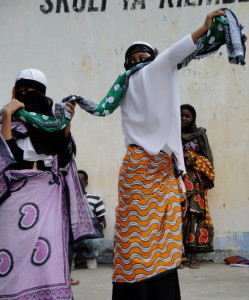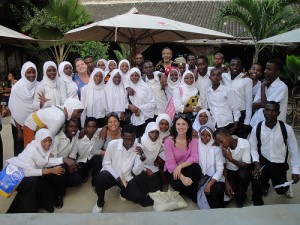“Girls that rarely participated verbally in class, spoke confidently and passionately in front of an audience of parents and peers in English. Their transformation was visible and remarkable; I watched their teachers and parents look on in amazement at what their girls could do, and most importantly what they had to say.” -Emily Morris, Director of the RISE Project, 2009
 GET has been working in Zanzibar since 2007, providing secondary school students with intensive English literacy training workshops using devised theatre techniques.
GET has been working in Zanzibar since 2007, providing secondary school students with intensive English literacy training workshops using devised theatre techniques.
Typically programs run for two weeks at each school and involve facilitating a group of 20-25 students through dramatic activities towards devising a performance. The students write and perform their own work based on their life experiences and dreams.
In addition, we mentor and train local teachers during the course of the worksop so that they can continue to implement these techniques in their own classrooms.
The workshops are highly structured and disciplined, teaching participants valuable skills in verbal and written communication, as well as offering them an opportunity for creative exploration.
“I believe that using theatre and playwriting techniques has helped our Form 3 students to increase their talents in written and oral expression in English. Also, this experience will spread to students in different classes.” -Dhihai Ali Dhihai, Headmaster, Kiembe Samaki Secondary School, Zanzibar, 2010
Why it is important for children to learn English in Zanzibar
While Swahili is the national language in Tanzania, English literacy is a high priority. The students in Zanzibar are required to learn English to succeed in their own school and community. To qualify for a free education after they have finished primary school and three years of lower secondary school, students need to pass difficult exams in spoken and written English, a language they are not taught in school until they are approximately twelve years old. Girls and boys who do not pass the required exams have little hope of the educational or professional advancement that they themselves long to achieve. The failure rate for these exams is over 50%.
 Empowering students to do well in school and supporting their desire to improve English literacy skills will afford those students the opportunity to affect more change in their communities by giving them the advantage of a degree that can only be won through passing oral and written exams in English.
Empowering students to do well in school and supporting their desire to improve English literacy skills will afford those students the opportunity to affect more change in their communities by giving them the advantage of a degree that can only be won through passing oral and written exams in English.
The Forum for African Women Educationalists (FAWE), which has an office in Zanzibar, lists predominant use of Kiswahili language affecting development of the English language as one of the key country challenges in girls education for Zanzibar. This pan-African organization’s entire mission is to empower girls and promote gender equity in education in Africa. English literacy is listed as a key factor for girls to be successful.
Western scholars, students, businesspeople, and tourists are constantly coming in and out of their communities, benefiting from all that they learn about the world through travel and benefiting monetarily by building businesses in Zanzibar. Why should Zanzibaris not be afforded the same opportunities? The Internet makes borders between countries less clear, opening avenues of discussion, education and business that were previously only available to the wealthy. Many of these avenues operate in English.
“I learn English better with making plays because I care about what I’m saying”-Eduu, Student, Kiembe Samaki Secondary School, Zanzibar, 2011
Help support this and other GET programs.
![]()